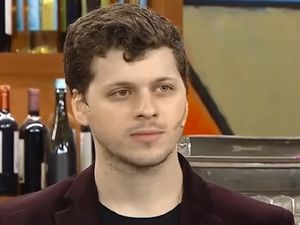Maximiliano Giaconia
Maximiliano Giaconía (Buenos Aires, July 23, 1993), also known as Max Giaco, is an Argentine illusionist, mentalist and lecturer specialized primarily in mentalism. His work is characterized by his use of psychology, nonverbal communication, and neuroscience in his talks and presentations.
Career
Giaconia began studying illusionism at the age of 12 through books and by attending courses, private lessons and seminars. At 15 he began performing at conferences in front of professional magicians. He then began his professional career performing at private parties, bars, and various other events.[1] In 2011, Giaconia participated in the event "Mágica Buenos Aires" organized by the Ministry of Culture of the City of Buenos Aires as part of a tribute to René Lavand at which various media outlets described him as “the magic revelation of the moment”.[2][3]
Giaconia performed at TEDxJoven@RíodelaPlata 2012, an event which was attended by more than 1,500 people and was declared of cultural and educational interest by the government of the City of Buenos Aires.[4][5]That same year he also participated in TEDxUBA giving a presentation about magic and math together with Andrés Rieznik. They would go on to give more than 100 performances of their show “Matemagia” at Tecnópolis that season.k[6]con quien luego realizó una temporada de más de 100 presentaciones en Tecnópolis con su show “Matemagia”. [7]
In 2013, the show “Matemagia” was included in Matbaires, a festival of mathematics and art organized by the Ministry of Culture of Argentina which was attended by more than ten thousand people. [8]
That same year, Giaconia collaborated with the Neuroscience Laboratory at Torcuato Di Tella University and CONICET (National Scientific and Technical Research Council) researchers on an investigation directed by Mariano Sigman about how introspective blindness determines the freedom of choice. Illusionist techniques were used during the experiments in order to influence or modify the participants’ decisions. [9][10][11]
In 2016 Giaconia was invited by the History Channel to participate in the TV series “Suggestions, the Science of Deception” ("Sugestiones, la ciencia del engaño").[12][13]
In March of 2019, Giaconia gave a presentation and performance at TEDxGualeguaychú about the relationship between magic and the mind and how magic can help the neurosciences.[14]
He gave a course at Baikal Institute covering different branches of magic with an emphasis on its psychological foundations.[15]
In order for the viewer to be amazed by magic, first they have to perform an intellectual process. Only after that process is carried out can the emotional impact be felt. Illusionists exploit cognitive biases, manipulate memory and attention, and anticipate behaviors in certain situations. We also induce certain decisions to be made.[16]
In the media
External links
- Maximiliano Giaconia on linkedin
- Maximiliano Giaconia on Facebook
- Maximiliano Giaconia on instagram
- Publications Authored by Maximiliano Giaconia PubFacts
References
- ↑ "Maximiliano Giaconia Quiero retruco" (HTML). Clarín. 12 January 2012. Retrieved 26 December 2019.
{{cite journal}}: Cite has empty unknown parameters:|urltrad=,|subscription=,|coauthors=, and|chapterurl=(help) - ↑ "Única función "Mágica Buenos Aires" en el Polo Circo" (HTML). La posta capital. 2 November 2011.
{{cite journal}}: Cite has empty unknown parameters:|urltrad=,|subscription=,|coauthors=, and|chapterurl=(help) - ↑ "Como por arte de magia" (HTML). Clarín. 4 November 2011.
{{cite journal}}: Cite has empty unknown parameters:|urltrad=,|subscription=,|coauthors=, and|chapterurl=(help) - ↑ TEDxRíodelaPlata, Maximiliano Giaconia Magia. "TEDxJoven@RíodelaPlata 2012". TEDx.
- ↑ "Más de 1500 adolescentes presenciaron la edición 2012 de TED x Joven Río de la Plata" (HTML). Continental.com. 21 May 2012. Retrieved 26 December 2019.
{{cite journal}}: Cite has empty unknown parameters:|urltrad=,|subscription=,|coauthors=, and|chapterurl=(help) - ↑ TEDx, Andres Rieznik y Maximiliano Giaconia. "Matemagia: Andres Rieznik y Maximiliano Giaconia en TEDxUBA". TEDx.
- ↑ "Andrés Rieznik en la Escuela de Educación Técnica Nº1 invitado por "Contando la Ciencia"" (HTML). lanación. January 2015. Retrieved 26 December 2019.
{{cite journal}}: Cite has empty unknown parameters:|urltrad=,|subscription=,|coauthors=, and|chapterurl=(help) - ↑ "Más de 10 mil personas participaron del MatBaires 2013" (HTML). Revista Cítrica. 16 September 2013.
{{cite journal}}: Cite has empty unknown parameters:|urltrad=,|subscription=,|coauthors=, and|chapterurl=(help) - ↑ "Choosing in freedom or forced to choose? Introspective blindness to psychological forcing in stage-magic" (HTML). Laboratory of Integrative Neuroscience, Physics Department, University of Buenos Aires.
{{cite journal}}: Cite has empty unknown parameters:|urltrad=,|subscription=,|coauthors=, and|chapterurl=(help) - ↑ "País de Ilusiones" (HTML). Página 12.
{{cite journal}}: Cite has empty unknown parameters:|urltrad=,|subscription=,|coauthors=, and|chapterurl=(help) - ↑ "Un libro que teje relaciones impensadas entre el ilusionismo y la neurociencia" (HTML). Telam.
{{cite journal}}: Cite has empty unknown parameters:|urltrad=,|subscription=,|coauthors=, and|chapterurl=(help) - ↑ "La Ciencia del Engaño - Ep6".
- ↑ "SUGESTIONES - La ciencia del engaño".
- ↑ TEDx, Maximiliano Giaconia. "Maximiliano Giaconia - TEDx Gualeguaychú - How magic can help the neurosciences?". TEDx.
- ↑ "La magia de nuestra mente".
- ↑ "Los sesgos cognitivos que juegan en la magia hacen de las suyas en la economía" (HTML). lanación. 10 November 2019. Retrieved 26 December 2019.
{{cite journal}}: Cite has empty unknown parameters:|urltrad=,|subscription=,|coauthors=, and|chapterurl=(help)
This article "Maximiliano Giaconia" is from Wikipedia. The list of its authors can be seen in its historical. Articles taken from Draft Namespace on Wikipedia could be accessed on Wikipedia's Draft Namespace.
